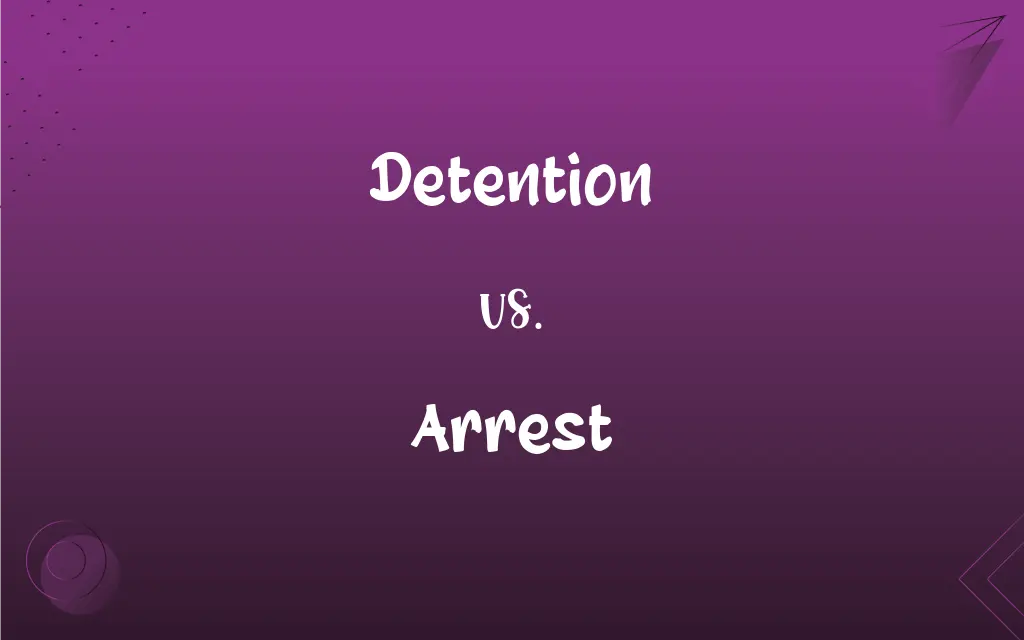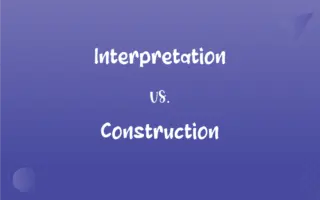Detention vs. Arrest: What's the Difference?
Edited by Aimie Carlson || By Harlon Moss || Published on November 11, 2023
Detention involves temporarily holding someone for questioning or investigation, while an arrest is the formal act of taking someone into custody for a suspected crime.

Key Differences
Detention and arrest, though related, have distinct legal implications and purposes. Detention typically refers to the temporary holding or restraining of an individual, primarily for questioning or investigative purposes. Arrest, on the other hand, signifies the formal act of taking someone into custody because there's enough evidence or reason to believe they've committed a crime.
While both detention and arrest restrict an individual's freedom of movement, the durations differ significantly. Detention is usually for a brief period, while an arrest can lead to a longer duration of custody, potentially until a court appearance or release on bail.
It's crucial to note that during detention, law enforcement officers might not have established grounds for an arrest. They might detain an individual based on reasonable suspicion. However, an arrest generally requires probable cause — a stronger legal standard — indicating that a person has likely committed a crime.
Detention doesn't necessarily result in charges being filed. A person might be detained, questioned, and then released without any further action. In contrast, an arrest usually implies that formal charges will be or have been filed against the individual.
In essence, while both actions involve a limitation on personal liberty, detention serves as a precursor or an investigative tool, whereas an arrest signals a formal accusation of a crime.
ADVERTISEMENT
Comparison Chart
Purpose
For questioning or investigation.
Formal custody due to suspected crime.
Duration
Typically brief.
Potentially longer, until court or bail.
Legal Requirement
Reasonable suspicion.
Probable cause.
Result
May or may not lead to arrest.
Charges are typically filed.
Restriction Level
Temporary restriction of movement.
Formal restriction of liberty and rights read to suspect.
ADVERTISEMENT
Detention and Arrest Definitions
Detention
Holding someone for investigative purposes.
The detective's detention of the witness helped clarify the case.
Arrest
Restraining someone due to suspected criminal activity.
The arrest was made on grounds of theft allegations.
Detention
A stoppage that doesn't necessarily imply guilt.
Despite the brief detention, he was allowed to go without charges.
Arrest
The act of taking someone into formal custody.
The officer made an arrest after finding evidence.
Detention
The act of temporarily holding someone.
The officer's detention of the suspect lasted for an hour.
Arrest
A step towards potential legal prosecution.
The arrest was the beginning of a lengthy trial.
Detention
A brief restriction of an individual's freedom.
She faced a short detention after the altercation.
Arrest
Deprivation of personal liberty over accusations.
Following her arrest, she contacted her attorney immediately.
Detention
A means to determine the need for an arrest.
The detention allowed officers to gather more evidence.
Arrest
A legal procedure indicating formal charges.
His arrest led to a court appearance the following week.
Detention
The act of detaining.
Arrest
To stop; check
A brake that automatically arrests motion.
Arrested the growth of the tumor.
Detention
A period of temporary custody while awaiting trial.
Arrest
To seize and hold under the authority of law.
FAQs
Does detention always lead to charges?
No, a person can be detained, questioned, and released without charges.
What's the main distinction between detention and arrest?
Detention is temporary holding for questioning, while an arrest is a formal custody due to suspicion of a crime.
Are rights read during a detention?
Typically, rights are read during an arrest, not during a mere detention.
What's required for a legal arrest?
An arrest generally requires probable cause that the person has committed a crime.
Are arrests made public?
Arrests are typically a matter of public record.
Is bail possible after detention?
Bail is associated with arrests, not detentions.
How long can an individual be detained?
The duration varies, but detentions are typically brief and cannot be unreasonably long.
Can you resist a detention?
It's advised not to resist any police action, including detention.
Do arrests have a set duration?
No, arrest duration varies based on charges, evidence, and legal proceedings.
What should one do when arrested?
It's advised to remain calm, not resist, and seek legal representation.
Can arrests occur without a warrant?
Depending on the situation and jurisdiction, warrantless arrests can occur, especially if a crime is witnessed.
Can detention lead to an arrest?
Yes, if during detention, enough evidence is found, it can lead to an arrest.
Can you be compensated for wrongful detention?
Depending on jurisdiction, if rights are violated, compensation may be possible.
Does arrest imply guilt?
No, an arrest is an accusation, and all are presumed innocent until proven guilty.
Can you request an attorney during detention?
Yes, you can always request an attorney, whether detained or arrested.
What happens after an arrest?
After an arrest, the individual is typically processed, and charges are formally filed.
Can minors be detained or arrested?
Yes, but procedures and rights may differ for minors.
Can you leave during a detention?
During a detention, freedom is restricted, so you cannot leave without officer consent.
Can detention occur without reason?
Legally, there should be a reasonable suspicion for a detention.
Can detentions occur without an officer present?
Typically, detentions involve law enforcement or authorized personnel.
About Author
Written by
Harlon MossHarlon is a seasoned quality moderator and accomplished content writer for Difference Wiki. An alumnus of the prestigious University of California, he earned his degree in Computer Science. Leveraging his academic background, Harlon brings a meticulous and informed perspective to his work, ensuring content accuracy and excellence.
Edited by
Aimie CarlsonAimie Carlson, holding a master's degree in English literature, is a fervent English language enthusiast. She lends her writing talents to Difference Wiki, a prominent website that specializes in comparisons, offering readers insightful analyses that both captivate and inform.








































































